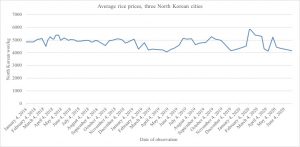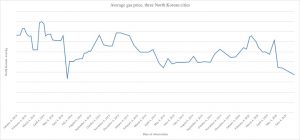By Benjamin Katzeff Silberstein
So, the news are out: the central committee of the WPK has formally decided that the Party will hold its 8th Congress in January 2021:
8th Congress of WPK to Be Convened
Pyongyang, August 20 (KCNA) — A decision of the 6th Plenary Meeting of the 7th Central Committee of the Workers’ Party of Korea was made on August 19.
The decision is as follows:
Our Party and people are carrying out the historical task set forth at the Seventh Congress of the Workers’ Party of Korea while breaking through head-on all the barriers to our advance by organizing and launching an arduous revolutionary struggle.Through this indomitable struggle for implementing the decision made at the Seventh Congress of the WPK the dignity and position of our state has been remarkably raised, the single-minded unity of the Party and the people further consolidated and a great revolutionary turn made in the building of the Party and its overall activities.
On the other hand, economy was not improved in the face of the sustaining severe internal and external situations and unexpected manifold challenges, thereby planned attainment of the goals for improving the national economy have been seriously delayed and the people’s living standard not been improved remarkably.
The plenary meeting, after analyzing and reviewing the experience and lessons from the work of the past five years for building a powerful socialist country, decided to convene the Eighth Congress of the WPK as follows to set forth a correct line of struggle and strategic and tactical policies on the basis of the new requirements of our developing revolution and the prevailing situation:
1. The Eighth Congress of the WPK will be convened in January, Juche 110(2021).
2. The agendas of the Eighth Congress of the WPK are as follows:
1) Review of the work of the Central Committee of the WPK
2) Review of the work of the Central Auditing Commission of the WPK
3) On revising the rules of the WPK
4) Election of the leadership organ of the WPK Central Committee
3. One delegate with the right to vote to the Congress will be appointed among every 1 300 Party members and one delegate with the right to speak among every 1 300 candidate Party members. -0-
Kim Jong-un’s speech, however, was far more interesting than the announcement of these agenda items. In my opinion, there are hints in his speech that the Party will continue down the road of strengthening state and Party control over the economy. That doesn’t necessarily spell a return to central planning, but it does mean more restrictions and stronger demands that enterprises and other economic actors adhere to state “goalposts”; perhaps targets of production, and sectors of priority. More like a developmental state than a Stalinist command economy, at least in theory.
Look, for example, at the following two paragraphs from the summary of his speech (my emphasis):
Calling for regularly convening the congresses of the Party, the supreme guidance organ of the Party, in order to confirm the line, strategic and tactical measures for steering the development of the times and the revolution and adjust and reinforce the leadership body for guaranteeing their execution, he advanced the important guidelines for the operation of the congress.
And:
The Supreme Leader stressed the need for all the sectors and units including the Party organizations at all levels, power organs and organs of the armed forces to regularly in time sum up the results of the work so as not to deviate from the implementation of the Party’s basic lines, policies and decisions. He also said that they should encourage and develop good successes, overcome shortcomings and take rectification measures at the double and thus achieve new progress in advancing the revolution and construction and in strengthening the Party.
This fits well with the simultaneous announcement of another five-year plan for economic development. This also doesn’t mark a return to central planning, necessarily, but rather, the state asserting its right to set forth the main guidelines of economic development. The last one, adopted in 2016, was subsequently abandoned, and we should also not expect this coming strategy to be entirely written in stone.
The agenda item about the central auditing commission is also interesting. In these contexts, auditing often entails the state scrutinizing the books of various organs, looking for off-the-books resources and other ways to bring in more cash to the state.
An agenda item for the central auditing commission is nothing unique in itself, but substantially, it may relate to the current push of the state to take in more resources from wherever they can be found.
Over the past couple of years or so, as its funds have run increasingly low, the state has been pushing private and semi-private economic actors to hand over more of their resources to the government. Strengthening auditing practices may be a way of institutionalizing this push more regarding finances related to the Party.
(Update 20/8/20: I clarified the text somewhat above about the central auditing commission after this came up in a twitter discussion.)


